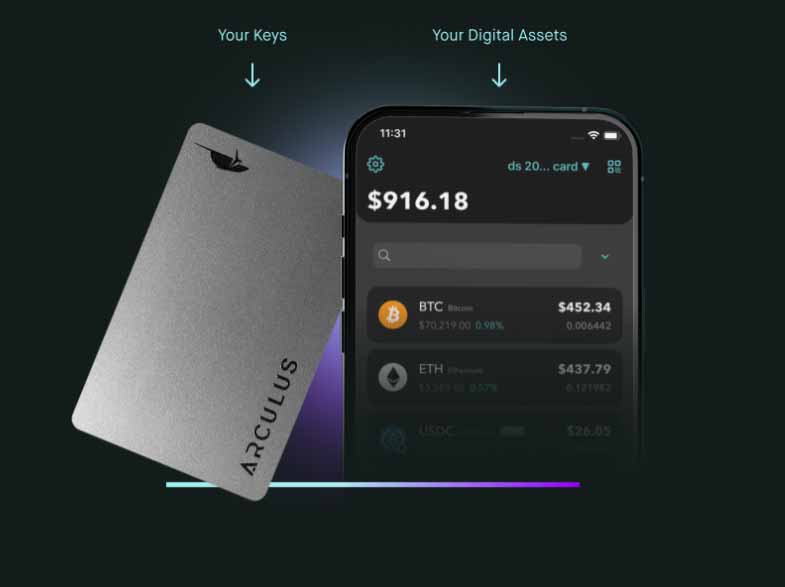As the popularity of cryptocurrencies like Bitcoin and Ethereum continues to rise in Canada, so does the importance of securing these digital assets. One of the most effective ways to protect your cryptocurrency is by using a cold wallet. This article will delve into what cold wallets are, why they are essential for crypto users in Canada, and how to choose the best cold storage wallet for your needs.
What is a Cold Wallet?
A cold wallet, also known as a cold storage wallet, is a type of cryptocurrency wallet that is not connected to the internet. By keeping your private keys offline, cold wallets provide an extra layer of security against online threats such as hacking, phishing, and malware attacks. This makes them an ideal choice for long-term storage of significant amounts of cryptocurrency.
Why Use a Cold Wallet in Canada?
Canada has embraced cryptocurrency adoption, with many Canadians investing in digital assets. However, with increased adoption comes increased risk. Cybercriminals are continually developing new methods to steal cryptocurrencies from online wallets and crypto exchanges . By using a cold wallet crypto solution, Canadian investors can significantly reduce the risk of losing their assets to cyber threats.
Security Benefits
- Offline Storage: Keeps your private keys away from internet-connected devices, eliminating exposure to online attacks.
- Control Over Private Keys: You retain full ownership and control over your private keys, ensuring that only you have access to your funds.
- Protection Against Exchange Hacks: Storing your crypto on exchanges can be risky due to potential breaches. Cold wallets mitigate this risk.
Peace of Mind
Knowing that your cryptocurrency is securely stored allows you to focus on other aspects of investing or trading without constant worry about potential security breaches.
Types of Cold Wallets
There are several types of wallets available to Canadians, each with its own set of features and benefits.
Hardware Wallets
Hardware wallets are physical devices designed specifically for securing cryptocurrencies. They are considered the best cold wallet option for most users due to their robust security features and ease of use.
- Popular Hardware Wallets in Canada:
- Ledger Nano X: Supports multiple cryptocurrencies, Bluetooth enabled for mobile use.
- Trezor Model T: Touchscreen interface with support for a wide range of coins.
- KeepKey: User-friendly design with high-level encryption.
Paper Wallets
A paper wallet involves printing your public and private keys on a piece of paper, which is then stored securely. While it’s a cost-effective method, it requires meticulous handling to prevent loss or damage.
Metal Wallets
Metal wallets are similar to paper wallets but involve engraving your keys onto metal plates, offering greater durability against fire and water damage.
How to Choose the Best Cold Storage Wallet
Selecting the best cold storage wallet depends on various factors, including security features, supported cryptocurrencies, user experience, and price.
Security Features
- PIN and Passphrase Protection: Prevent unauthorized access if the device is lost or stolen.
- Backup and Recovery Options: Ability to recover funds if the device is damaged or lost.
- Secure Element Chips: Hardware-based encryption to safeguard private keys.
Supported Cryptocurrencies
Ensure the wallet supports all the cryptocurrencies you intend to store. Most leading hardware wallets support a wide range of coins and tokens.
User Experience
- Ease of Setup: The initial configuration should be straightforward.
- User Interface: A clear and intuitive interface simplifies transactions.
- Customer Support: Reliable support can assist with troubleshooting and inquiries.
Price
Hardware wallets vary in price. While it’s essential to consider your budget, don’t compromise on security features for cost savings.
Setting Up Your Cold Wallet
Once you’ve chosen the best cold wallet for your needs, follow these general steps to set it up:
- Purchase from a Reputable SourceBuy directly from the manufacturer or authorized resellers to avoid counterfeit products.
- Initialize the DeviceFollow the manufacturer’s instructions to set up your wallet. This typically involves:
- Creating a PIN.
- Generating a seed phrase (usually 12-24 words) for recovery.
- Secure Your Seed Phrase
- Write it down on the provided recovery sheet.
- Store it in a safe and secure location, such as a safety deposit box.
- Never store it digitally or share it with anyone.
- Install the Companion AppMost hardware wallets come with a desktop or mobile app to manage your cryptocurrencies.
- Transfer Your Cryptocurrency
- Use the wallet’s receiving address to transfer funds from an exchange or another wallet.
- Confirm the transaction on the blockchain.
Best Practices for Cold Storage in Canada
Regularly Update Firmware
Manufacturers release firmware updates to enhance security and add features. Regularly check for and install updates.
Use Official Software
Only use software and apps provided by the wallet manufacturer to avoid malware or phishing attempts.
Verify Addresses
Before sending or receiving funds, double-check the wallet addresses to prevent man-in-the-middle attacks.
Physical Security
- Store the Wallet Securely: Keep your hardware wallet and seed phrase in separate, secure locations.
- Consider Multiple Backups: For seed phrases, store copies in different secure places.
Integrating Cold Wallets with Bitcoin Casinos
For Canadian crypto enthusiasts interested in online gambling, integrating a cold wallet with Bitcoin casinos can enhance security.
Steps to Follow
- Transfer Funds to a Hot Wallet
- Cold wallets are not ideal for frequent transactions.
- Transfer the amount you wish to gamble to a reputable hot wallet like Trust Wallet or Atomic Wallet.
- Connect to the Casino
- Use the hot wallet to deposit funds into your casino account.
- Ensure the casino is licensed and secure.
- Withdraw Winnings Securely
- Withdraw your winnings back to your hot wallet.
- Transfer significant amounts back to your cold wallet for secure storage.
Benefits
- Enhanced Security: Keeps the bulk of your funds secure while allowing easy access to gambling funds.
- Budget Control: Limits the amount available for gambling, promoting responsible gaming.
Legal Considerations in Canada
While cryptocurrency use is legal in Canada, it’s essential to be aware of regulatory aspects.
Taxation
- Capital Gains Tax: Profits from cryptocurrency may be subject to capital gains tax.
- Record Keeping: Maintain detailed records of all transactions for tax purposes.
Compliance
- Anti-Money Laundering (AML) and Know Your Customer (KYC) regulations may apply, especially when using exchanges or online casinos.
Cold Wallets vs. Non-Custodial Wallets
In the world of cryptocurrency, both cold and non-custodial wallets offer ways to securely store your assets, but they work in distinct ways and serve different security needs.
Cold Wallets
Cold wallets are offline storage solutions, typically hardware devices or paper wallets, which keep private keys disconnected from the internet. This significantly reduces the risk of hacking or unauthorized access. Cold wallets are best suited for long-term storage, providing a high level of security ideal for users holding large amounts of cryptocurrency or who do not need frequent access.
- Advantages: Enhanced security, minimal risk of online hacking.
- Disadvantages: Less convenient for daily transactions; requires physical access.
Non-Custodial Wallets
Non-custodial wallets are digital wallets where the user retains full control of their private keys. Unlike custodial wallets, where a third party (such as an exchange) manages the keys, non-custodial wallets ensure that only the user has access to their funds. This type of wallet is often online and may be a software or mobile app, making it convenient for transactions and accessible anytime.
- Advantages: User retains full control, suitable for frequent transactions.
- Disadvantages: Higher risk of phishing attacks if used online; requires secure handling of private keys.
Both cold and non-custodial wallets allow users to maintain ownership of their assets, but cold wallets emphasize offline security, while non-custodial wallets prioritize accessibility with user-managed keys.
Cold Wallet vs Hardware Wallet
Cold wallets and hardware wallets are both popular choices for securely storing cryptocurrency offline. While these terms are sometimes used interchangeably, there are key differences between them.
Cold Wallets
A cold wallet is any type of cryptocurrency storage that is kept offline, meaning it has no internet connection. This category includes hardware wallets but also extends to other methods like paper wallets. Cold wallets are generally viewed as the most secure way to store crypto because they are isolated from online threats.
- Examples: Paper wallets (a physical printout of your private keys), hardware wallets, or air-gapped computers that hold crypto assets.
- Best For: Long-term storage with maximum security, especially if you don’t need frequent access to your funds.
Hardware Wallets
A hardware wallet is a specific type of cold wallet in the form of a physical device. It stores private keys securely and signs transactions offline. Hardware wallets often look like USB devices and can be connected to a computer or smartphone to access funds. They are built to be resistant to malware, making them one of the safest options for secure storage.
- Examples: Devices like Ledger, Trezor, and KeepKey.
- Best For: Users who want a secure offline wallet with the option of easy access through a physical device for occasional transactions.
Key Differences:
- Form Factor: All hardware wallets are cold wallets, but not all wallets are hardware devices. Cold wallets include paper wallets and offline computers.
- Ease of Use: Hardware wallets allow relatively easy access to your funds through a physical device, whereas paper wallets require more manual handling to access funds.
- Security: Both offer offline protection, but hardware wallets are more resilient to physical damage or accidental loss compared to paper wallets.
In summary, while both cold and hardware wallets provide strong security by staying offline, hardware wallets combine offline storage with convenient access through a secure, dedicated device.
Examples of Cold Wallets

arculus cold wallet Hardware Wallets
Hardware wallets are physical devices that keep private keys offline. They are secure and user-friendly for storing cryptocurrency:- Ledger Nano S / Ledger Nano X
- Trezor Model One / Trezor Model T
- KeepKey
- Arculus Cold Storage Wallet – Utilizes three-factor authentication with a biometric lock, PIN, and NFC Key Card for secure, offline storage.
- Paper Wallets
Paper wallets involve printing or writing down your private and public keys on paper, keeping them offline:- BitAddress and WalletGenerator.net are tools for creating paper wallets.
- Air-Gapped Computers
An air-gapped computer has no internet connection and is used to store cryptocurrency keys or sign transactions securely. - Metal Wallets
These are metal plates where private keys are engraved, designed to withstand physical damage:- CryptoSteel and Billfodl are examples of durable metal wallets.
Each wallet provides offline storage, but options like Arculus offer advanced features that add layers of security and convenience.
In the ever-evolving landscape of cryptocurrency, securing your digital assets is paramount. For Canadians invested in crypto, utilizing a cold storage wallet is a prudent step toward safeguarding your wealth. Whether you’re holding Bitcoin, Ethereum, or any other digital currency, the best cold storage wallet will offer robust security features, ease of use, and peace of mind.
By understanding the types of cold wallets available and following best practices, you can confidently navigate the crypto space. Whether you’re a casual investor or actively using crypto in online casinos, the importance of secure storage cannot be overstated.
Frequently Asked Questions
- Is a Cold Wallet Necessary for Small Amounts of Crypto?
For small amounts of cryptocurrency, a cold wallet may not be necessary. Many users choose online (hot) wallets for small balances due to their convenience and easy access. However, if you’re highly security-conscious or plan to hold your assets long-term, a wallet can still be a valuable option, even for smaller amounts. - Can I Use a Cold Wallet for Daily Transactions?
Cold wallets are generally not ideal for daily transactions, as they require additional steps to access funds. Cold storage is primarily used for long-term holding due to its offline nature. For regular transactions, a hot wallet is more practical, as it allows quick access to your crypto without the added security steps. - What Happens If I Lose My Hardware Wallet?
If you lose your hardware wallet, you can still recover your funds as long as you have your recovery seed phrase—a sequence of words provided when setting up the wallet. This phrase allows you to restore your wallet on a new device. Without the seed phrase, however, your funds may be permanently inaccessible. - Are Hardware Wallets Compatible with All Cryptocurrencies?
Hardware wallets support a wide range of cryptocurrencies, but not all. Major wallets like Ledger and Trezor support most popular coins, such as Bitcoin, Ethereum, and many ERC-20 tokens. Before purchasing, check the specific wallet’s compatibility with the cryptocurrencies you intend to store. - How Do I Know If a Hardware Wallet Is Genuine?
To ensure your hardware wallet is genuine, purchase it only from official or authorized retailers. A genuine device should come sealed in its original packaging, with tamper-evident features. Additionally, setup instructions should direct you to download software from the manufacturer’s official website, ensuring that you’re using legitimate firmware. - What is a cold wallet?
A cold wallet is a type of cryptocurrency storage that is kept offline, meaning it has no connection to the internet. This isolation from online networks helps protect it from hacking or other cybersecurity threats, making it one of the safest ways to store digital assets. Wallets can be hardware devices, paper wallets, or even air-gapped computers. - Do you really need a crypto cold wallet?
If you plan to hold a significant amount of cryptocurrency or store it for a long time, a cold wallet is highly recommended. Unlike online (hot) wallets, cold wallets provide an extra layer of security by keeping private keys offline, reducing exposure to hacking attempts. They are ideal for those who prioritize security over convenience. - Are cold wallets 100% safe? While cold wallets are among the safest options for storing cryptocurrency, they are not 100% immune to risk. Physical theft, loss, or damage to the wallet can compromise access to your funds. Additionally, mishandling the private key (such as writing it incorrectly) can lead to loss of assets. However, when stored and managed properly, cold wallets offer a very high level of security.
- Which cold wallet is best?
The best cold wallet depends on individual needs. Popular options include Ledger Nano X, Trezor Model T, KeepKey, and Arculus Cold Wallet. For simple and affordable solutions, paper wallets are an option, while hardware wallets like Ledger and Trezor provide user-friendly features and strong security for digital assets.
Resources for Canadians
- Canadian Bitcoin Exchanges: Platforms like Bitbuy and Coinsquare for purchasing crypto.
- Canada Revenue Agency (CRA): Guidelines on cryptocurrency taxation.
- Financial Consumer Agency of Canada: Information on digital currency regulations.
By taking proactive steps to secure your cryptocurrency with a cold wallet, you can enjoy the benefits of digital assets while minimizing risks. Stay informed, stay secure, and make the most of your crypto investments in Canada.






